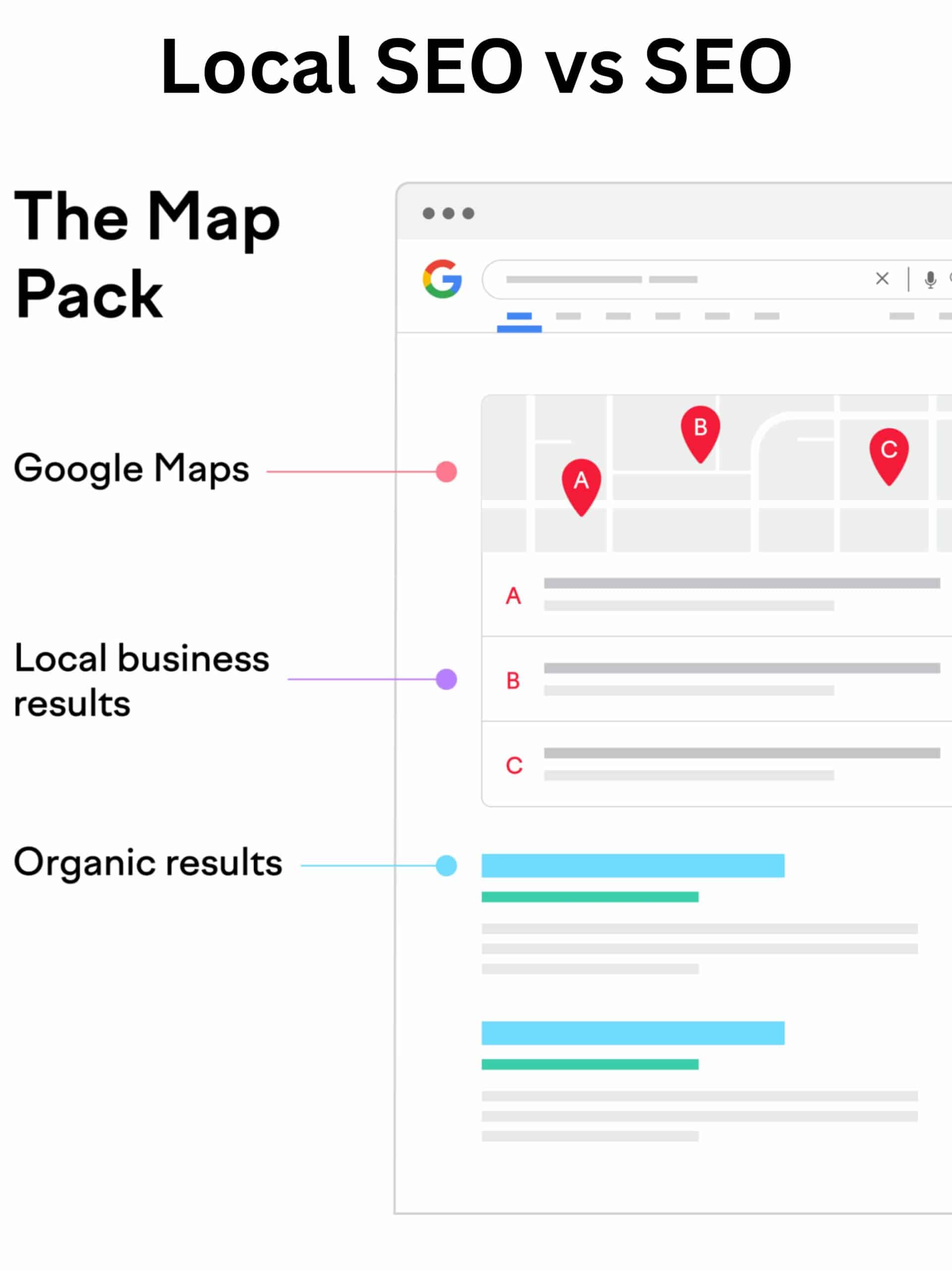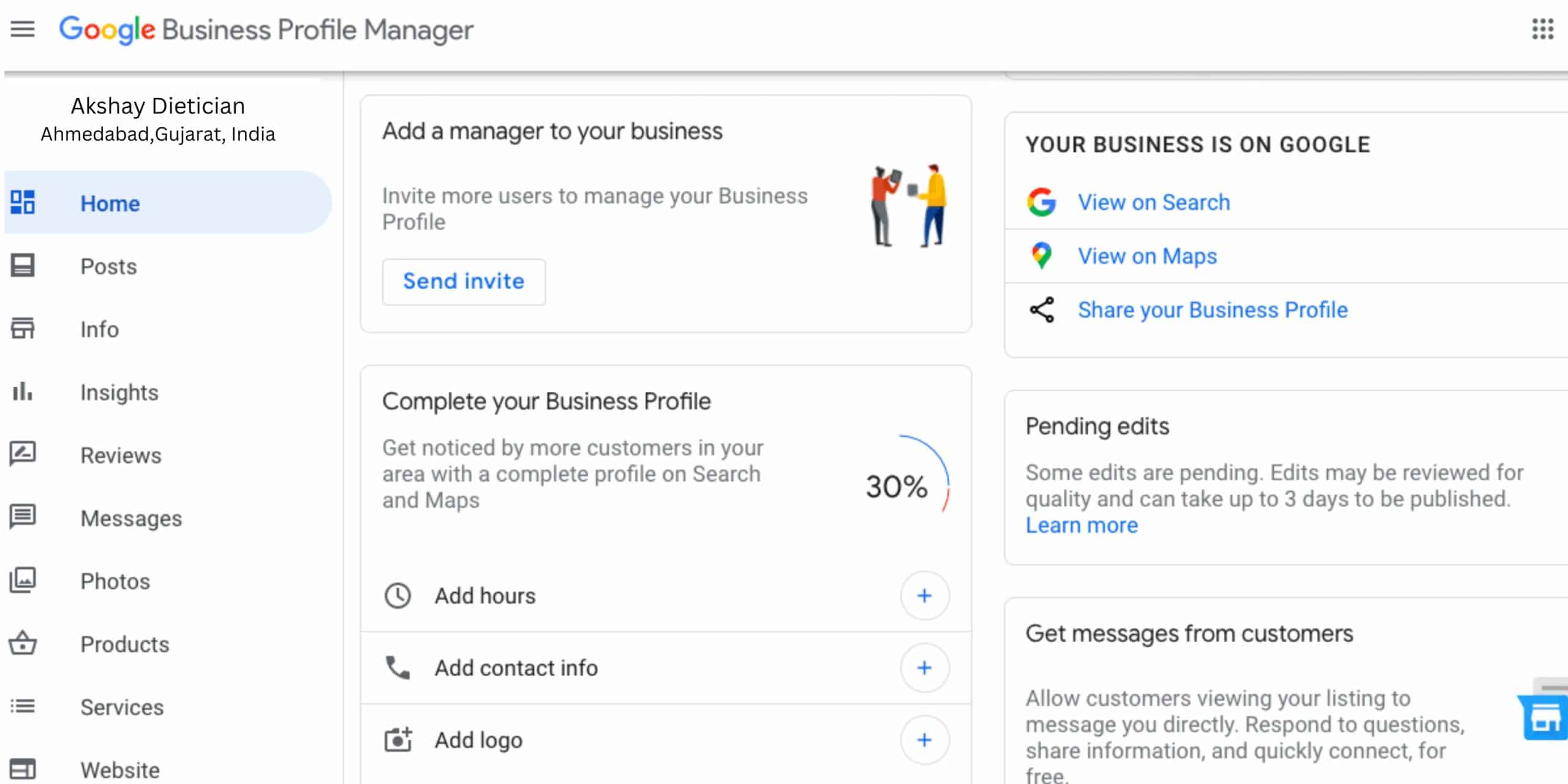Optimize your Local SEO, Competition among local businesses is usually neck-to-neck.
Local SEO, in such cases, is a powerful tool for promoting your local business online and standing out from the competition.
While general SEO focuses on achieving higher ranks in search engines at a domestic or international level, local SEO is preferred for better ranking in local area searches.
It is the most effective marketing method for attracting local customers to your brand, products, and services.
While global search engine optimization is critical, local SEO cannot be overlooked. According to one report, 50% of shoppers who use their smartphone to perform a local search visit a store the same day.
What is local SEO?

The process of optimizing a business, product, or service for an online location-specific search query is known as local SEO.
Google (and other search engines) determine what results to display to a user depending on their geolocation.
When someone searches for a dentist, car wash, or locksmith in their area, the search engine will show the local businesses that are relevant to their region.
Local SEO vs SEO

The component of geography is the basic difference between local SEO and organic SEO.
That is why, whenever you search for something, the search engine displays relevant results from nearby.
If you want a pizza for lunch at work, for example, you’ll Google ‘pizza delivery near me.’ After that, Google will show you a list of pizza places near your workplace.
Similarly, the results will be completely different if you conduct the same search at home.
The primary goal of local SEO is to allow search engines to offer you the most relevant results.
Traditional and local SEO both aim to improve your businesses’ ranks in search results so that more people can find, contact, and buy from you.
Many of the SEO and local SEO approaches are the same. Local SEO, on the other hand, employs a variety of strategies to help you connect with local searchers.
To drive visitors to a website, SEO relies on large-scale generic keywords.
If your company has a physical location and wishes to appeal to consumers within a specified radius or geographic area, local SEO strategies are the logical choice.
Ways to optimize your Local SEO
With constant algorithm updates to search engines and an ever-increasing number of sites vying for local visibility, getting your website seen takes a significant amount of effort.
However, it doesn’t have to take up all of your time and effort, and you may devote a significant amount of time and work to developing your local SEO approach.
Create a Google My Business Listing

The first step in optimizing any website to rank higher in Google Local results and obtain visibility in local Google map search results is to optimize your Google listing, otherwise known as My Business profile.
You’ll need a Google My Business account with a link to your website for this. Keep a close eye on your local keywords and strive to incorporate them into your profile.
Now, as you work to improve your business profile, keep the following in mind:
- While creating a Google my business account, verify ownership of your company.
- You should give accurate information.
- Encourage your consumers to post Google reviews for your company.
- Include your logo, business hours, payment method, and product information.
Claiming and filling out your company listing’s information is critical for your local SEO listing, especially for your Google Local Pack and SERP results. Don’t be disheartened if your business category isn’t featured; there are over 2,000 categories, and some of them are strange, so do your best to discover the greatest suit for your company.
As you fill out your content, use both primary and LSI keywords as much as can, as this accounts for about 20% of your chances of being included in the Local Pack.
Optimize Listing for Local Keywords
Now is the chance to use a keyword research tool and run a deep local keyword search if you haven’t already.
This will give you all the information you need at this point, including which keywords are most important to your business, their projected value, and the level of competition for ranking for them.
For example, if your business is a plumbing company in Boston, you’ll want to examine search volumes for terms like “plumber, Boston,” “plumber in Boston” and so on. You might also try searching for hyper-local keywords like “plumbing services, Boston.”
Optimize the Website for Local Keywords
Once you have a list of local keywords for which you’d like to rank, the following step is to optimize your website & my business listing for them. This is a tried-and-true local SEO tip that is just as relevant in 2021 as it was five years ago.
Of course, site optimization is a separate topic, but here are some onsite local SEO fundamentals.
To begin, make certain that your home page and any service pages include the local keywords you want to rank for in the:
- Headings
- Title Tags
- Meta description
- Body
- Footer
If at all feasible, you should strive to use your core local keyword within the URL.
When using keywords, make sure to employ them naturally rather than keyword stuffing.
Keywords are crucial for local SEO, but if utilized incorrectly, they can harm your rankings. Search engines are not smart enough to spot pages that are only for the sake of SEO.
Customers also don’t find pages with keyword stuffing to be very informative, and they’re less inclined to linger around.
A few well-placed keywords, local page reviews, and high-quality links can go a long way. With just a handful of these suggestions, your website will almost certainly notice a rise in local traffic shortly.
Get authentic reviews for your listing

Ask your consumers or clients to write reviews for you.
Google reviews benefit local SEO in two ways:
First, they improve your Google My Business presence. Second, it encourages other customers in the area to purchase your goods or services.
Here is how to get those reviews:
- Ask customers directly for reviews.
- Send a post-purchase email to your customer/client asking them to provide a review.
- Respond to and thank your existing reviewers. Also, respond to your customer’s complaints or problems in a professional manner.
- Remember not to give reciprocal discounts or reward people for leaving reviews. Good hate this.
Create a Separate page for Every Location
Is your company a multi-location business? If that’s the case, you’ll want to make sure you’re showing up in local searches for all of the locations.
Creating separate pages for each location is one way to accomplish this. For example, if you provide services in Houston, San Antonio, and Austin, create a service page for each city instead of a single service page that lists all of these locations.
Local search phrases should be optimized for these pages. They must also have original content. If you use the same content on all of your location-based service pages, Google may flag it as duplicate content, which will negatively impact your page rankings.
Directory Submission
You should also list your local business in other internet directories in addition to Google My Business.
This suggestion can be found in practically any local SEO handbook because it is such a powerful SEO component.
The following are some of the most important directories to target:
- FourSquare
- Angie’s List
- Yelp
- About Us
- Bing Places
- HotFrog
- Best of the Web
You should also check to see if there are any local online business directories in addition to these national and global listings. Google will receive additional local SEO signals from these listings.
When you submit your business to a directory, make sure that it includes a link to your website, preferably a do-follow link. Backlinks, as we call them, are links pointing back to your website that help in better search engine rankings.
Make sure, however, that the backlinks come from credible websites rather than spammy ones. The stronger the reputation, the better the chances of achieving a higher local rating.
Update NAP Citations
NAP stands for “name, address, and phone number” and refers to your company’s name, address, and phone number.
NAP consistency across your all business listings is critical for Google’s local pack algorithm and for establishing citations.
Your NAP should be consistent across all platforms where you have business listings, including websites and social media accounts.
An inaccurate phone number is a red flag, and Google may decide not to publish your GMB listing because they are unsure if your company is authentic.
Furthermore, your NAP information must not only be correct but also consistent. At this time, Google isn’t sure how to handle variations like Avenue vs. Ave. and may misinterpret it as different information.
Aside from that, you’ll want to keep a watch on your NAP information in the future. If your company relocates, you should update this across all platforms as soon as possible.
You should also keep an eye on the NAP information in your Google My Business listing. Consumers can now suggest modifications to a business’s profile information, and Google may act on these suggestions.
You’ll want to catch any suggestions made in error or in an attempt to sabotage you as soon as possible.
Get High-Quality Backlinks
Backlinks are the top rankings signals for any type of SEO.
Building backlinks isn’t a one-size-fits-all activity, but there are a few tried-and-true techniques you may use in the case of local SEO.
One way is to reach out to people in your field with whom you already have a connection. Contractors, suppliers, distributors, neighboring firms, partners, and wholesalers are examples of these.
Make a list of these companies to begin. Then, to speed up the process, look for pages on their websites where you may insert a contextual link. You can contact the companies on your list and recommend link placements from here.
Guest posting is another method for generating contextual inbound links. If any of the companies on your list have a blog, you might offer to write content for them that includes a link to your website.
You can also engage with local influencers on social media or via email to encourage them to link back to you.
Create content based on local stories
Non-local content is the focus of most content marketing efforts.
While this will bring you a larger audience and more traffic, it will not help you if you are a locally operating business.
It’s critical to develop local content if you want to maximize your content marketing efforts for increased lead generation.
You can generate local content around a variety of topics. By using local keywords, you may link-local information to your offerings.
For example, if you’re a caterer, you could write a blog post about how to identify the best caterer in your neighborhood. This helps you to add local keywords to your text naturally.
You can also develop content around local news and events in your industry.
You’d be a little overwhelmed if you compared your firm to other local businesses in comparable niches.
There are a lot of them, but you’ll probably find that the majority of them haven’t optimized their local landing pages for search.
One of the finest things you can do to improve your website and boost SEO is to create local content that optimizes keywords like your region, services, or unique niche.
Conclusion
You might try to focus on the hundreds of signals that Google examines in their local search algorithm if you want to dominate the local search results.
And, over time, you should strive to strengthen your total authority in every area that you influence.
However, there are a few things you can control and execute right now that can offer your local Google results a significant boost over your competitors.
Using Schema language efficiently throughout your website and crucial web pages, maintaining keyword consistency between your Google company page and your website, and Researching hyperlocal and relevant directories for citations, are surefire strategies to offer your local business an advantage in Google’s local search results.
With a tiny footprint and a local SEO-optimised website, your company/business could outrank the larger competition.
Because local SEO is already driven by user intent, the conversion rate will be significantly greater than with organic SEO. As a result, for local businesses, local SEO makes it easier for customers to locate you.
FAQs
How do I optimize local SEO?
Local SEO Tips 1. Optimize for Google My Business. 2. Engage on social media and add posts to Google My Business. 3. Ensure your name, address, and phone number are consistent online. 4. Optimize online directories and citations. 5. Perform a local SEO audit. 6. Improve your internal linking structure.
How can I optimize my SEO for free?
On-Site Ways to Improve SEO 1. Create great content. 2. Use the right keywords. 3. Perfect your titles and meta descriptions. 4. Opt for static URLs. 5. Share with the right audiences on social media. 6. Guest post on blogs in your niche. 7. Score easy links to your site. 8. Build your brand.
How can I improve my local search ranking?
How to Improve Local Ranking in 5 Steps 1. Perfect Your Google My Business Profile. This profile can make or break your local SEO strategy. 2. Edit Your Website With SEO In Mind. Next, take a look at your website. 3. Implement a Content Marketing Strategy. 4. Collect and Respond to Customer Reviews. 5. Spend Time Building Local Links.
What are local SEO benefits?
One of the most obvious benefits of local SEO is that it helps users in your area find your business. A lot of people use local search tools while on the go, with queries like “baby gate near me” to quickly bring up the closest options.

